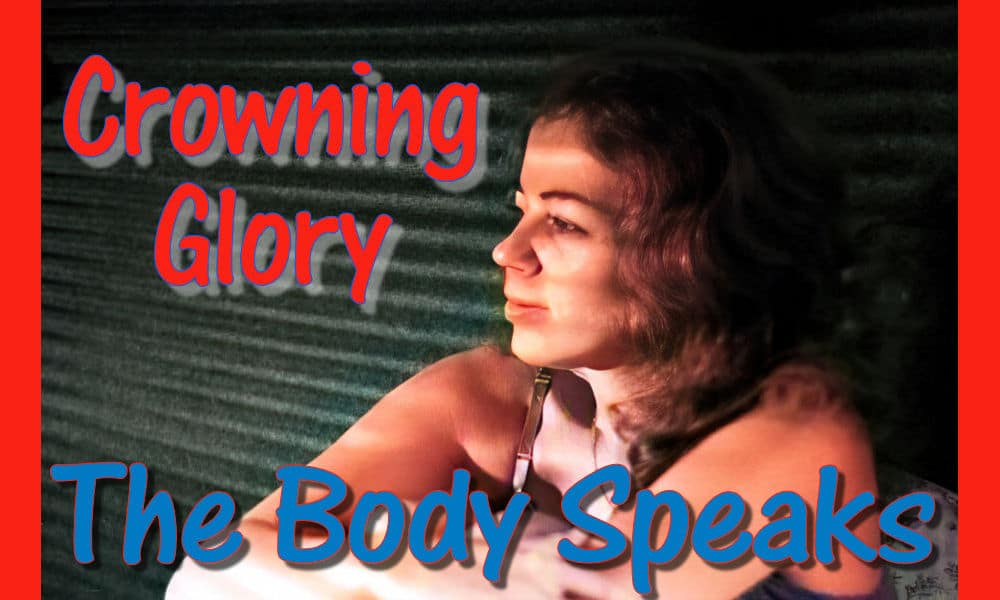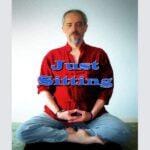Crowning Glory — our heads are a blessing and a curse. If we buy into our stories, we live in our heads, miserable. Or, we can continually choose to see our games while not biting.

Psst!! Hey!!!
** Want more great writing designed to help YOU to shift your behaviour?
** Want to learn how to find, build or deepen your principal relationship?
** Want to know more about Zen living and being?
Check out Wayne’s books! (amazon link)
Or, check them out right on our site.
This is the last article in this Series — The Head Zone — “Crowning Glory”
The concepts we’ve been looking at are superficially easy, and there lot of people get all of this stuff, at least intellectually. What there is a decided lack of is actually living any of it.
Most people, for example, “get” the idea of no self. They just refuse to experience it.

was me!”
The theory of “self-less-ness” makes sense, but it’s really hard to give up the idea of a permanent self, past and future, and the ego’s view of being really, really important.
Simple Zen guy that I am, I’m only curious about how people (including me!) are actually living their lives.
If they are creating misery for themselves, (and no doubt blaming all and sundry — externals — for their pain) I remain unconvinced that their” understanding” is doing them much good.
Similarly, many people I know are Spiritual junkies.
Which is sort of where our topic is heading.
In Chinese medicine the crown of the head is seen as an entry point for chi. It’s often pictured like this.

Batman!
The image shows a funnel of chi — energy — the bottom of which is firmly screwed into the head.
Through this funnel, the person receives “the bountiful blessings of heaven.”
Here’s where this goes off the rails.
Life is, indeed,exactly like this. In case you haven’t noticed: if you’re not dead, the Cosmos is providing everything you need.
As a matter of fact, it’s even providing stuff, experiences, that you either don’t know you need, or wish you didn’t need.
Here’s the off the rails part.
Most people think that the Cosmos operates on a reward / punishment system. Thus, “If I’m a good little Doobie, ‘somebody up there’ is going to shower down goodness upon my little head.
And all those people I don’t like? Well, I’ll just pray that they get straightened out, preferably by being tortured in ways that I think appropriate.”
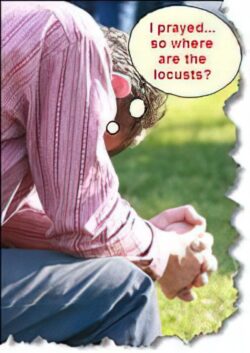
And often, they’re quite pissed off when the bad thing they want to happen to the other person doesn’t happen. Hallelujah.
Speaking of prayer, most people do this thing by griping and complaining, and then telling “God” how to solve the problem. Then they sit there, tapping their little feetsies, waiting for God to go along with their little plan.
There is a line in the Bible that goes something like,
“The rain falls on the just and the unjust alike.”
Fake-Spiritual people hate this line, as it just doesn’t seem fair.
In the Zen world, it’s impossible to tell exactly what ‘just’ and ‘unjust’ looks like, apart from each person’s skewed personal preference.
This goes right back to what we’ve been talking about for the past many weeks. Our existence is totally, 100%, subjective.
It’s all about the stories we tell ourselves.
In the last article, I made an attempt to contrast Seeing with thinking, or better put, storytelling. Seeing is all about simple perception of the ongoing nature of life — of the ongoing nature of the universe.
As soon as you start thinking about it, and analyzing it, you’ve left the flow of the moment-by-moment experience and ended up back in your head, where nothing is real, and distractions abound.
Truly Seeing is, oddly, nothing more than living moment-by-moment in the here and now.
- Which is amazingly hard to do.
- Which is something that needs constant reinforcement.
- Which has absolutely nothing to do with anyone else, or
- with others giving you permission to do it.
It’s like meditation. You either do it, or you don’t. Blaming external circumstances, who you are living with, or whether you feel like it is simply going back into your head and making another excuse.
Back to the funnel photo. Just what is all that stuff streaming into our heads?
I think of it it as both moment-by-moment experience, and the provision of exactly what we need, without our earning or deserving any of it.
I just finished a book called, “Buddhism is Not What You Think,” by Steve Hagen. Here are a few quotes:
Reality is always right here, right now. It’s just this …vibrant, immediate experience… Most of the time, however, we superimpose something onto what is immediate and Real. We project onto what we directly experience, and we extend that projection through time and space. Thus we create subjects and objects… The upshot is that we don’t engage the world as it actually is. Instead, we react to the world as we assume it to be — or, worse, as we think or wish it ought to be.“
p.204–05
The games our mind plays with us go on until we die.
Nattering, scattering, and storytelling is what our minds are all about.
Our job, decidedly, is NOT to fight against our mind. Our goal is to sidestep our mind by “simply noticing.” Quoting Hagen again,
The awakened see Reality as it is. They see that enlightenment is nothing more than not being deceived by the conceptual world each of us creates… The most basic split, of course, is “here I am” and “out there is everything else.” … The enlightened person isn’t taken in by such conceptual dualities. Still, it isn’t that the illusion goes away. The illusion still appears, but it’s seen for what it is — an illusion. And this seeing is utterly liberating.“
p. 206
And that stream of stuff, flowing into our heads? This flow is all there is.

I once read somewhere that we are, and everything we perceive is, sort of like a bubble in a rushing stream. The bubble appears both “real,” and “separate” from the water.
The bubble is actually “water-ness” that seems to appear on the surface of the water.
It appears, goes with the flow, and then pops, and vanishes.
At no time however, can we think of the bubble as being separate from the stream. Other than in our twisty — turny little minds.
To quote Hagen:
It’s not that the universe is made up of innumerable objects in flux. There’s only flux. Nothing is (or can be) riding along in the flux, like a cork in a stream; nothing actually arises or passes away. There’s only stream.“
p. 220
Now, back to the dilemma.
Many people equate being Spiritual with being special.
Darbella and I were considering, briefly, going off to Ohio to meditate. I was really impressed that the Zen Center said that no one meditating there was to wear robes, or use their “Dharma name.” (A Dharma name is the name you are given when taking Buddhist precepts.) They said that everyone was the same at their Center — and I just amused myself, as it’s also so that we are all the same at our center (inside of us.)
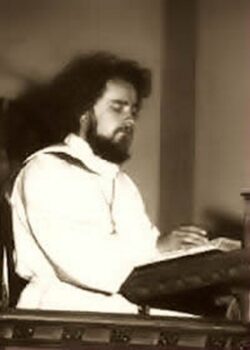
Anyway, I’ve always been a guy who likes “dress up.” Back when I was in the Ministry, I had all the outfits. It was entirely possible that if I put on the full regalia, the outfit had cost me $1000.
There were points when my hair and beard resembled what I thought of and jokingly called my Rasputin look.
Therefore, part of me would love to hop into a set of Zen robes — many times, I wear Chinese style martial arts clothing when I meditate. I examine my motivation relentlessly — and believe I wear them because they’re comfortable and have pockets.
But I recognize I have attraction for costumes. It reminds me of the old doggerel:
I see by your outfit that you are a cowboy.
I see by your outfit that you’re a cowboy too.
We see by our outfits that we are both Cowboys.
If you buy an outfit you can be a cowboy too.
Special, special, special.
Which makes it hard to simply be the flow. Not of the flow, not in the flow, not the special, special part of the flow — but the flow itself.
And the joke is, whether you get this or not, whether you believe this or not, whether you hate this or not, this is what there is — this is all there is — the flow.
Getting the joke about a separate identity (while still having one, we’re not nuts here) means that you are freed up — liberated — and are therefore capable of acting and being as you act and be, moment- by-moment. You see the stream, the flow, and you recognize it for what it is — that which empowers and enlivens us all. It’s not the possession of the special, it’s not a tool to be used to gain something.
It and you just are.
Back to sitting. Literally and figuratively, he says with a smile.
Many people show up to learn meditation, and they have a goal in mind. They want to relax, they want to manage their pain, they want to find themselves. They may even think that meditation will lead to enlightenment.
While it is possible to achieve such practical goals, and indeed, as you meditate, such things can and do happen — the real purpose of meditation is to see the flow of life, and the endless silliness of the thoughts we concoct in our heads.
Meditation does not stop the thoughts — it can’t — nothing can.
Our egoic thoughts, our desperate selfishness, our burning desire to be different, is our constant companion. Meditation helps us to see what we do up there in our little heads, and to just let it be.
Thoughts come, thoughts go, and are meaningless yet tempting.
We can attach to them and follow them, or we can laugh and let them go. If we do the latter, we find ourselves “just sitting” in pure awareness.
If you read back over the articles in this series, you’ll see themes emerging.
The most obvious is the one about the mind, and the mind’s games.
Yet, if you look, you’ll see that none of the Zones have anything to do with thinking, analyzing, or categorizing. Rather, from tie to head, it’s all about simple experience.
That’s the joke behind the line, “If you meet the Buddha on the road, kill him.” You can’t see the Buddha outside of yourself, because there is nothing outside of yourself, and if you’re seeing him out there somewhere, you’re missing the point.
Now, all good Westerners know, (have been browbeaten into believing,) that we are all born in sin and need a Savior. Good luck with that. Our crowning glory reminds us that salvation, like everything else, is an inside job. That you continually forget this, and look outside for salvation, is not the fault of the Cosmos.
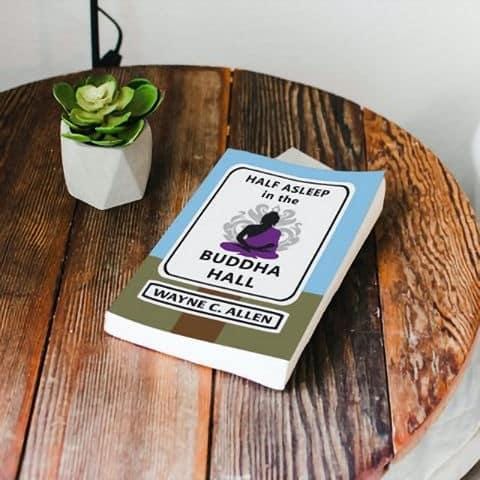
Looking for more on this topic?
Check out my book,
Half Asleep in the Buddha Hall.
My “Eastern” book takes you by the hand and helps you to find peace of mind.
Half Asleep in the Buddha Hall is a Zen-based guide to living life fully and deeply.
(Here’s a direct Amazon link)
Purchase digital versions (Apple, Nook, Kobo, etc.) from this page

